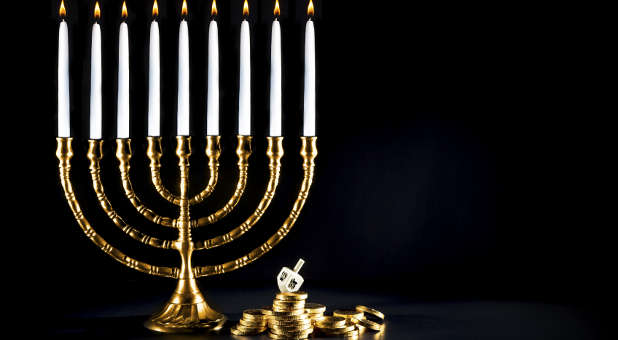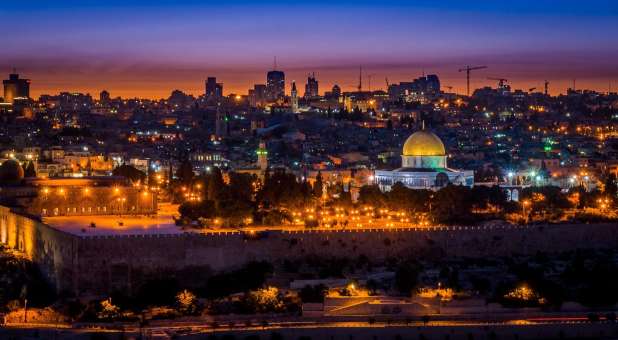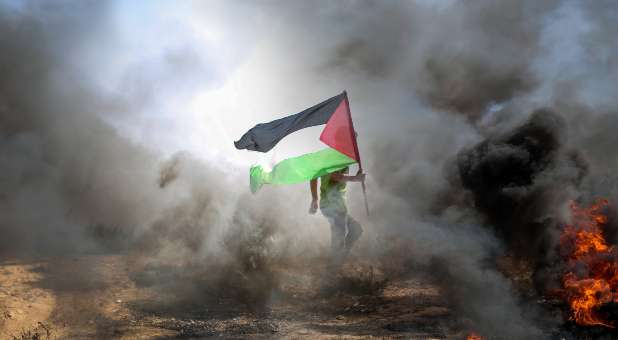Every winter when I was a child, as Christmas trees and manger scenes filled the world around me, I confess I dreaded Hanukkah. Growing up in a non-Jewish part of town when ethnic diversity definitely was not celebrated, Hanukkah left me the odd girl out.
But through the year-in, year-out challenge, Hanukkah was doing in me what God wanted it to. I was learning that those who follow Him are in the world but not of it (not that Christmas is necessarily worldly). I didn’t know it then, but Hanukkah showing me how to overcome in these last days in which we now live.
The Back Story: Compromise
After the close of the Hebrew Scriptures, many in Israel (Judea) fell from faith into apostasy. Compromise with the world sadly overtook them until the majority of God’s people embraced the Hellenistic culture of their age. Before long even the priesthood grew corrupt. Abandoning a biblical lifestyle for pagan hedonism, some Jewish men went so far as to surgically reverse their circumcisions. The few who remained faithful to God’s Word were persecuted by other, more liberal Jews. As a result, not unlike much of the West today, conditions in Israel were ripe for anti-God leaders and policies to set in.
The Spirit of Antichrist Defeated
In 175-164 BC, a Seleucid (Greco-Syrian) emperor named Antiochus IV rose to power across the Middle East. As prophesied in portions of Daniel 7-12, he sought to rule the whole, then-known world as one people. With great arrogance he surnamed himself “Epiphanes,” meaning Manifest God. Antiochus Epiphanes made it illegal to preach or teach the Word, on punishment of death. With widespread murderous tortures, he aimed to destroy the worship of Yahweh and biblical faith.
The crisis reached its tipping point when Antiochus Epiphanes committed an abomination of desolation in the Holy Temple (see Daniel 9:27). First, he replaced Israel’s high priest with a Hellenized Jew who strongly supported his anti-God policies. Then he erected an idol-statue of Zeus in the Temple and had a pig sacrificed on the altar. At that point, the Maccabee family of priests rose up to resist and eventually defeat him. Antiochus Epiphanes himself died a natural, or rather supernatural, death.
Yeshua refers to prophecies about Antiochus Epiphanes in the book of Daniel when speaking to His disciples of the future (Matthew 24). A second Hanukkah-like fulfillment would occur not long after His death and resurrection. In A.D. 70, the Temple would again be desecrated, even destroyed, and Israel would be overrun. But another, consummate fulfillment of portions of Daniel 7-12 would take place shortly before the Messianic Age. Again the temple would apparently be desecrated (Matthew 24:15). At that time, the spirit of antichrist would be embodied in human form—until defeated by the Ancient of Days (Daniel 7:22, Revelation 19:11-20).
Some Christians have stumbled over these prophesies, trying to squeeze them into one and only one fulfillment (usually, A.D. 70). Most traditional Jewish teachers, however, find multiple fulfillments or manifestations at varying levels through history. These fulfillments all reflect the same principle: The worship and reign of Yawheh is devilishly contested on earth. Ultimately, however, His people are victorious and His kingdom comes.
The Maccabees Overcome
The Maccabees were a tiny band of priests, seemingly insignificant. Though vastly outnumbered, they clung passionately to God’s Word, rallied others to Him, repented on behalf of Israel, and embraced a lifestyle of prayer and fasting. They learned how to battle militarily. Courageously enduring heinous tortures, they loved not their lives unto death. God used this obscure remnant to preserve the Jewish people and biblical faith, preparing for Messiah’s first coming. So stirring is the Maccabees’ faith that their acts of heroism and martyrdom are honored in New Covenant Scripture (Hebrews 11:35-38).
The Maccabees’ story would not be complete without mentioning that about 30 years after the Hanukkah victory, they too became corrupt. Sadly, after they secured positions of power in the land, their fiery dedication to God faltered. Their end, however, needn’t be ours. By the grace and power of Holy Spirit, the last days’ bride of Messiah will overcome by the blood of the Lamb and word of their testimony, shining like the brightness of heaven (Revelation 12:11, Daniel 12:3).
Supernatural Oil for the Lamp
According to legend, when the Jews regained control of the temple, they found in it just one cruse of oil. The oil was sufficient to keep the seven branched temple lamp stand (menorah) burning only one day. Miraculously, however, the oil is said to have burned eight days. Not coincidentally, precisely eight days were needed to ritually purify more oil. But more important, eight is the number of days God mandated for the Feast of Tabernacles, which is when the first and second temples had both been dedicated. The original Hanukkah (meaning “Dedication”) was actually celebrated as a type of delayed Feast of Tabernacles to rededicate the temple. Since then, to celebrate Hanukkah, a special menorah called “Hanukiah” is lit. The Hanukiah has eight branches instead of the usual seven. The eight branches are ignited by an extra “servant” branch. Not coincidentally, “Branch” and “Servant” are both references to Messiah in the Hebrew Scriptures. Today, Hanukkah can be a perfect time to rededicate your own living temple to God, knowing He’ll supply all the oil you need.
If Today is Hanukkah, Christmas is Coming
In the Hanukkah story, the anti-Jewish/anti-Christ spirit animating Antiochus Epiphanes sought to annihilate the Jews. Had he succeeded, the Messiah of humankind could not have been born. But in a divinely ironic twist of events, the Scriptures indicate Yeshua was likely conceived during Hanukkah. If that is true, the Light of the World was appropriately incarnated during what was known by New Testament times as the eight-day Festival of Lights. The number eight represents new beginnings in Scripture, so that could also fit prophetically with the timing of His conception.
In any case, Hanukkah was significant enough for Yeshua to have observed it (John 10:22-23). You and I can be richly blessed by gladly doing the same. This Hanukkah, as you stand firm in truth, unwavering in Messiah’s love, may your light shine bright.
Sandra Teplinsky has been in Messianic Jewish ministry since 1979. She is president of Light of Zion, an outreach to Israel and the church based in Southern California and Jerusalem. She is an ordained minister and prophetic conference speaker, and has written several books and articles about Israel and the church.
See an error in this article?
To contact us or to submit an article






















